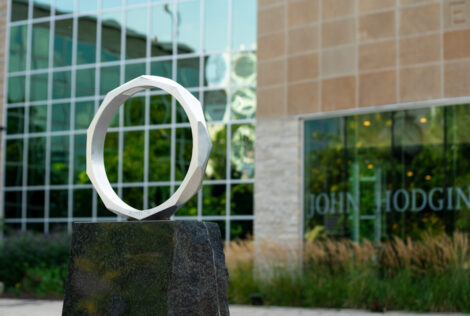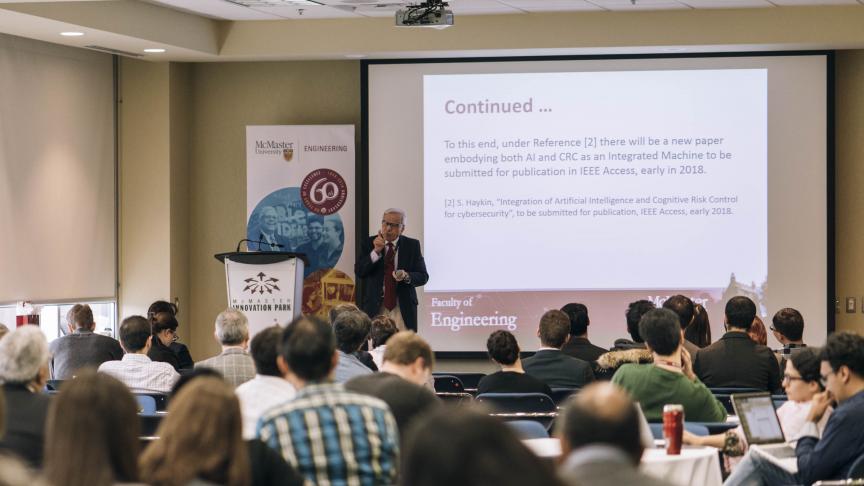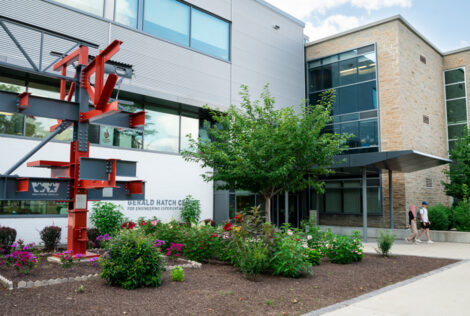

From making cars safer, to improving patient diagnosis, Artificial Intelligence (AI) is transforming the way we interact with technology. This was evident at the sold-out McMaster.AI Workshop where industry and academics came together to discuss how AI is impacting engineering innovation and everyday life.
Hosted by McMaster Engineering and the MacData Institute at McMaster Innovation Park on November 29, the event featured 16 speakers and panellists including Tomi Poutanen, Co-founder and Co-CEO, Layer 6 AI and Co-founder of the Vector Institute for Artificial Intelligence; Afsaneh Fazly, Director of Research, Thomson Reuters; and Gordon Alexander, Healthcare Industry Technical Leader, IBM Innovation Space.
The Poster Showcase portion of the event gave McMaster students an opportunity to share their research with leaders in AI. Attendees voted for their favourite poster using an AI technology provided by OverAir, a start-up founded by McMaster alumnus, Ethan Do. Attendees voted quickly and easily by tapping a card with a wireless communication technology at a kiosk. OverAir’s content management platform collects information and tracks analytics in real-time.
Meet four McMaster Engineering students who presented their research at the event, including the winner of the poster showcase, Yangliu Dou:
Yangliu Dou, 1st Place
Program: Mechanical Engineering PhD student
Research: “Have you noticed the blind spot detecting system in your car? It checks the absence of a car. My system can do more. It can tell the driver whether it is safe or not to move into another lane using a neural network with a gated branch [software integration pattern] for mandatory lane changing.”
Why McMaster: “As a PhD student at McMaster I can collaborate with people from different disciplines, dig deeper, solve challenges and translate my research into industrial applications to help people and contribute to society.”
Laura Pravato
Program: School of Biomedical Engineering Master’s student
Research: “I’m developing a remote electrocardiogram (ECG) [a test that records the heart’s electrical activity] using an Internet of Things (IoT) device. The IoT device allows me to connect my ECG circuit to the Internet to upload and analyse the data collected.”
Different from other medical devices: “There is a similar device on the market, but it’s not connected to the Internet. With this device, you can use a platform like IBM’s Watson to watch a livestream of your ECG, detect any irregular heart activity, or predict the risk of a heart attack. My device is also wireless, so it’s small, compact and battery-powered.”
Pursuing health tech as a career: “McMaster professors are really willing to let you work on any project. This isn’t my thesis project but it’s something I’m interested in doing as a career.“
Shafiul Alam
Program: Mechanical Engineering MASc student
Research: “I am improving the condition of tools used in automotive and aerospace manufacturing industries to increase process productivity, standardize the quality of parts made and save industries money. In the McMaster Manufacturing Research Institute (MMRI), I am implementing a tool monitoring technique that looks at cutting tool condition data and storing that data in libraries for machining processes.”
Where AI comes in: “The machining libraries will allow me to create an Artificial Intelligence based tool condition monitoring interface for the manufacturers to detect when a cutting tool needs to be replaced.”
The benefits of working in the MMRI: “It was my dream to come to Canada [from Bangladesh] and it was my dream to work in the MMRI. The MMRI is enhancing our industry experience.”
Wade Genders, 1st runner up
Program: Civil Engineering PhD Student
Research: “We’ve all had this experience of arriving at an intersection and we’re the only ones there and yet, we have to wait for a red light. So my research is trying to address this problem. There are developments in machine learning that can help us build more adaptive systems that can be much more optimal so we don’t have to wait at this red light. I’ve developed a computer system that is trained for three months, and over that time it becomes better than the systems we currently have at an intersection.”
Why he loves his research: “My research is a little different from traditional civil engineering research. Mine is cross-disciplinary which allows me to interface with different people from computer science and industry.”


